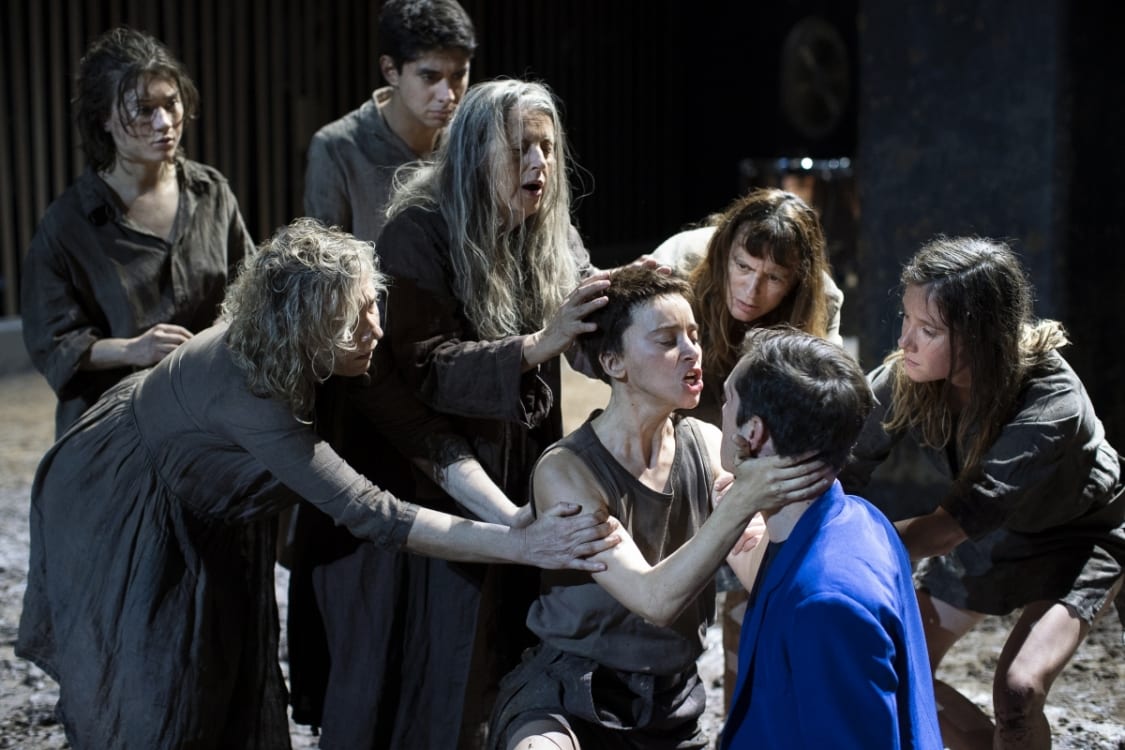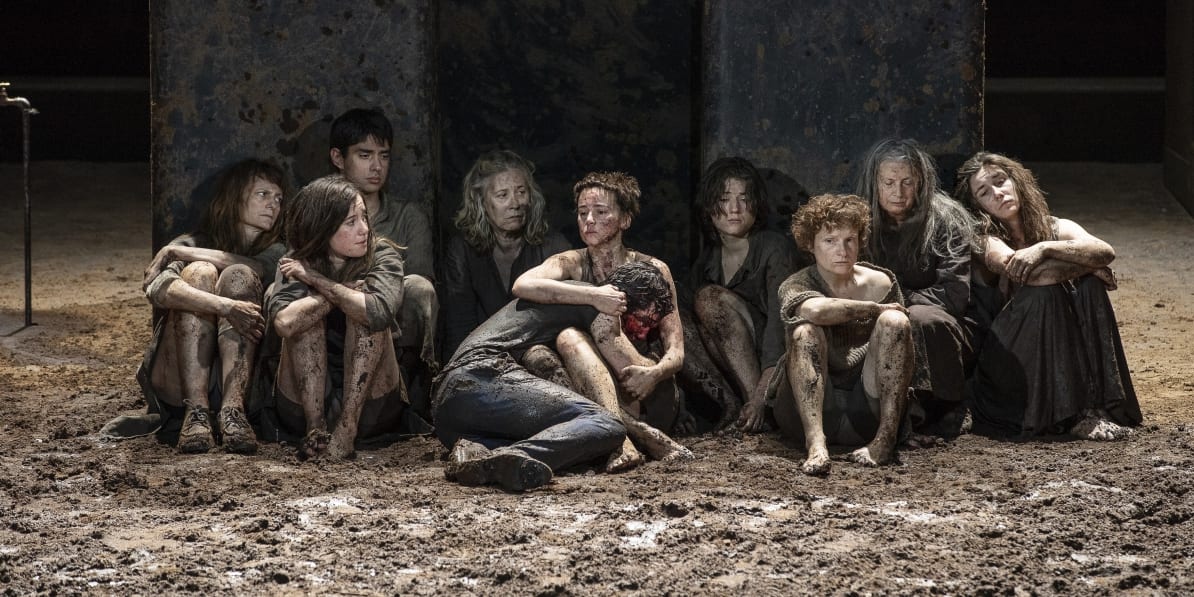Before seeing Electre/Oreste at the Vieux-Colombier theatre, I had seen its stage covered with a lot of things: beer, feathers, tissues, confetti, sand, fake blood, a giant plastic bag… and thanks to Ivo Van Hove’s latest creation, I can add ‘mud’ to that list. [At the foot of the English review, there is a summary in French]
Van Hove’s debut direction of a Greek tragedy is a fusion of two plays by Euripides: Electra (413 BC) and Orestes (408 BC). The two characters who give their names to the play are siblings who were separated as children when their father Agamemnon was assassinated by their mother Clytemnestra and her lover Aegisthus. The play opens with Electra (Suliane Brahim) living in dire poverty in Argos, wearing rags in this mud-filled environment. Two strangers wearing electric blue suits arrive on stage, pretending to be messengers of Electra’s lost brother, Orestes. Unsurprisingly, they are actually Orestes (Christophe Montenez) and his faithful friend Pylades (Loïc Corbery). The two of them form a great pair: Christophe Montenez’s broken voice and magnetic looks easily make us feel Orestes’ frustration and his guilt, while Loïc Corbery, who follows him mutely at the beginning, reveals himself as an endearing and powerful supporting role.
Euripides’ texts are violent: they include matricide along with other murders, body parts being taken off, and great psychological pain. It highly reminds of The Damned, the director’s previous creation at the Comédie Française. According to him, both of the plays have in common the representation of radicalisation, and function as a diptych. Van Hove, just like in The Damned, represents radical violence with bright colours. The blood red and electric blue colours appeal to the spectator’s eye that mostly sees dull brown and grey colours on set. The overload of fake blood almost makes the play look like an Italian Giallo from the 1970s, but it works well. Violence is also expressed through the actors’ bodies: Electra and her chorus perform beautiful, wild dance scenes, evoking something rough and primitive, close to prehistoric imagery. Choreographer Wim Vandekeybus’ work brings rhythm to the play that could have been too slow without those energetic dance scenes. They are visually incredible, and the barefoot actresses also produce music with their bodies when dancing in the mud, creating something peculiarly organic, somehow appealing to the spectator’s body too.
The whole cast, most of it already seen as a dysfunctional family in Van Hove’s previous collaboration with the company, The Damned, is brilliant. The way the two main actors play their characters twists gender stereotypes: I did not expect to see a fierce, wild Electra and a fragile, always curled up Orestes. Both of them manage to stay extremely charismatic even if their faces are covered with mud and blood for most of the play. Electra, filled with rage, manages to put the spectator on her side in the first part of the play, then Orestes, eaten away by guilt to the point that he buries himself alive, kindles their compassion for the rest of it.
Yet, the play’s true originality resides in its ending. In Euripides’ Orestes, Apollo saves everyone by telling them to live in peace and stop fighting so they can live happily ever after… but Ivo Van Hove chose to bring an ironic twist to this deus ex machina. During the living painting that is the play’s final bloodshed, Apollo (Gaël Kamilindi) literally jumps on stage, making the lights turn to gold and heaven-like. He walks peacefully on stage while the other characters freeze, delivering a message of harmony and happiness. And suddenly, against all expectations, he disappears and the fight continues as nothing happened. Rideau!

This cruel, accelerated ending was wonderful and left me speechless for a while. Pessimistic yet funny, I am not sure Euripides would have liked that ending – but the public of the Comédie Française did.
Here is a summary of the above review in French
La seconde collaboration d’Ivo Van Hove avec la troupe de la Comédie Française est, de même que Les Damnés, aussi provocante que brillante…et boueuse. Le metteur en scène réunit deux pièces d’Euripide en une : portés par la rage puis rongés par la culpabilité, Electre et son frère Oreste (Suliane Brahim et Christophe Montenez) émeuvent brutalement par leur performance organique. Marqué par des scènes de danse viscérales et une violence plastique qui se caractérise par la vivacité des couleurs bleues et rouges sur fond de boue, le spectateur est marqué de plus belle par la façon ironique et fataliste dont Van Hove s’approprie le deus ex machina final. Électrifiant.

